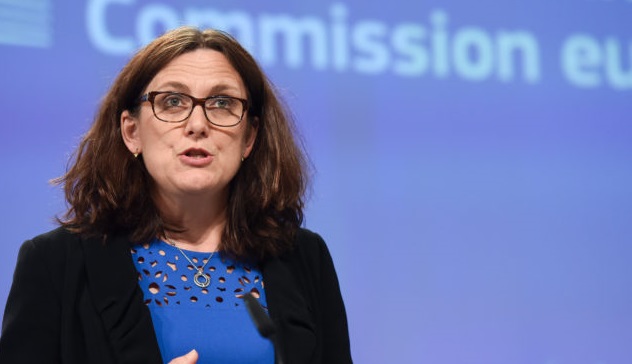EU urges tariff cuts
March 10, 2019 | Expert Insights

The European Union's chief trade negotiator urged President Donald Trump to stop imposing tariffs on the bloc if he wants the EU to help the United States pressure China to abide by rules governing the global economy.
Background
The European Union (EU) is a political and economic union of 28-member states that are located primarily in Europe. The EU has developed an internal single market through a standardised system of laws that apply in all member states in those matters, and only those matters, where members have agreed to act as one. EU policies aim to ensure the free movement of people, goods, services and capital within the internal market, enact legislation in justice and home affairs and maintain common policies on trade, agriculture, fisheries and regional development.
Anna Cecilia Malmström is a Swedish politician who has served as European Commissioner for Trade since 2014. She previously served as European Commissioner for Home Affairs from 2010 to 2014 and Minister for European Union Affairs from 2006 to 2010. She was a Member of the European Parliament (MEP) from Sweden from 1999 to 2006.
Since the US-China trade war began in early 2018, the EU has been caught between its profitable trade relations with both countries and the stern opposition of protectionist policies. Over the past year, the EU has tried on several occasions to de-escalate the trade war as its own exports were being targeted by both China and the US.
Analysis
EU Trade Commissioner Cecilia Malmstrom said she and US Trade Representative Robert Lighthizer have had productive meetings on how to address Chinese industrial policies and reform the World Trade Organisation. While both sides agree on problems, they differ over the solution.
"We have a problem: China is dumping the market, China is subsidising their industry, this creates global distortions. We can agree on that. So what is the solution? Well, we think it is to cooperate on China," Malmstrom said. "The solution to these problems is not imposing tariffs on the European Union. Why is that so hard to understand?" She added: "If you want an ally and partner, this is not the way to go about it."
Ms Malmstrom also said EU member states made resolving the US duties on European steel and aluminium a precondition before any bilateral trade deal can be concluded.
Mr Trump last month received a Commerce Department report on the national security risks of automobile and car part imports and has until mid-May to make a decision on whether to impose tariffs. He has repeatedly threatened to hit EU vehicles with tariffs of as much as 25 per cent.
The EU would retaliate against €20 billion (S$30.5 billion) in American goods, Ms Malmstrom said in the interview.
A broad list of products is being drawn up, and among those targets could be segments of the US auto industry, she said. "I would do that with a very heavy heart," she said. "We should work on common threats and common challenges and not impose tariffs on each other."
The EU was "deeply offended" by the fact that the US had designated it a national security risk when the Trump administration-imposed tariffs on EU steel and aluminium exports, Ms Malmstrom said at an event earlier on Thursday (March 7).
She said those duties, the threat of even more tariffs targeting European autos and the "very harsh rhetoric" have led to a lack of trust in the transatlantic relationship. However, she is working on rebuilding it through a trade agreement that is limited in scope and would eliminate tariffs on industrial goods. Negotiating a more comprehensive agreement is "not possible at this stage", she said.
Those talks have not formally started, though Ms Malmstrom said the EU would be ready in the next month.
The US and EU still disagree on the scope for any trade deal, with the US insisting that agriculture would be part of it and the EU vehemently denying it was ever part of the preliminary agreement that Mr Trump struck with EU Commission President Jean-Claude Juncker in July 2018.
Assessment
Our assessment is that the EU’s appeal to the US is based on a rational of free and equitable trade for all after assessing the damage done so far in the ongoing trade war. We believe that the temporary freeze of all new tariffs will be extended by President Trump based on the promising ministerial-level talks held with China in February 2019.








Comments